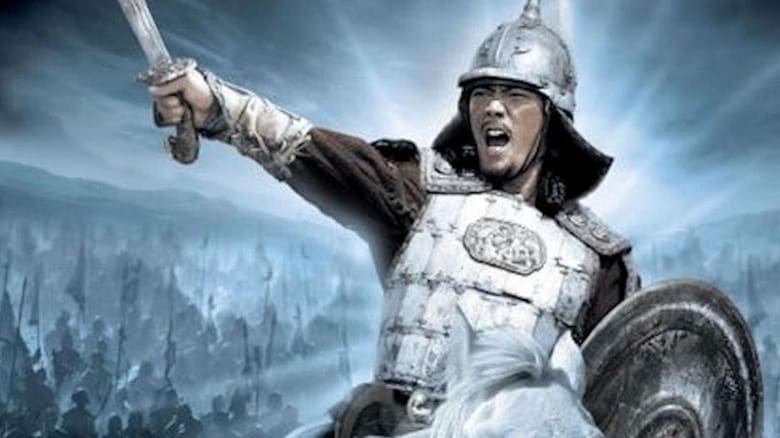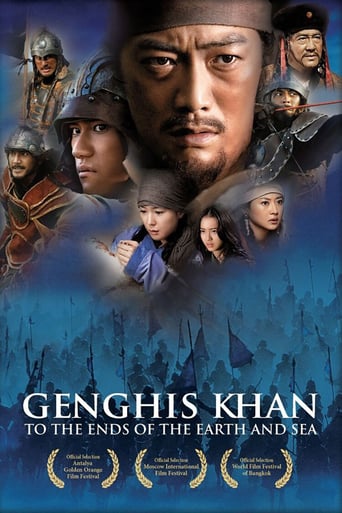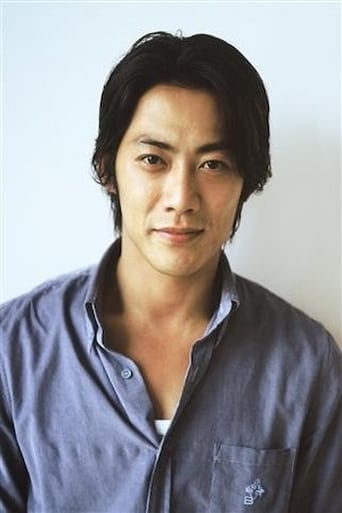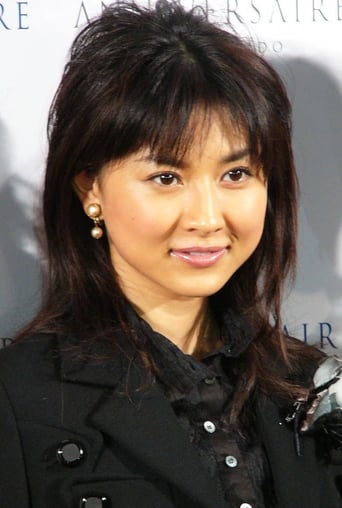A look at Genghis Khan's life, from his birth to conquests in Asia.
Reviews
Sorry, this movie sucks
Must See Movie...
Highly Overrated But Still Good
It is neither dumb nor smart enough to be fun, and spends way too much time with its boring human characters.
Before I saw the Japanese letters I thought it's a Hollywood movie, its characteristic is so Hollywoodish: perceptibly big budget, nice effects, and baaad script. The movie has pretty nice battle scenes and costumes, but probably that's all positive in it. While watching it I kept feeling it's not how steppe people behave, and sometimes I felt it's not like any people behave. Many scenes were overacted and/or corny. Gengishes character was quite different than the real life Gengish probably was. And the movies atmosphere was killed by the totally inappropriate music. That bugged me the most, they constantly used those customary corny symphonic tones we usually hear in the love scenes in Hollywood films! The finishing stroke was the end title music, which was some pop song! For a movie like this they should have used some Central Asian music! Only that would fit.I try to cite some real wtf moments (SPOILERS HERE!): (I think the whole childhood part could be cited, it's the worst part of the movie. I'm not sure if the young actors were bad or the script or both, but that part got really screwed!) When Gengish goes with his father go to look for a wife, there is a kinda stupid conversation between them in which the father mentions the blue wolf, as if the 14 years old boy haven't heard about that before. It's clear that he actually tells it to the audience, not to his son, but then why must he tell it?! They use a narrator, why doesn't she tells it instead? That would sound much less stupid!When Gengish meets Börte, they just stand near each other, and the writers couldn't give them any intelligent lines!Then comes Börtes friend, Jamuka (or how it's written), he just meets Genghis, they speak a very few words to each other, and they go for an archery contest right away. (Of course Gengish wins, with exceptional accuracy.)After the contest they vow eternal friendship. (Remember, they know each other for no longer than an hour!!!)As they vow, Jamuka explains to Genghis (actually to the audience again) what this friendship means, as if he didn't know! Again, why couldn't they use the narrator for the explanation, this makes Genghis look like a complete idiot!1-2 days later a messenger comes with bad news, and instead of telling them right away, he says "I'm sorry, I'm so sorry!" for minutes. And when he finally tells, Genghis acts like a total moron again!One time he is too coward to pull out his sword and fight his enemy. He runs away, than returns and kills his enemy when he sleeps. I'm not sure, maybe this was his true personality, but then why do they suggest differently other times? And if they want to picture him as a positive hero, then why didn't they make him win in a sword-fight? (All the above-mentioned scenes are from the childhood part!!!)In the whole movie people sit (or stand) not in front of, but next to each other (and in front of the camera). It's so unreal!When he captures Jamuka (after bloody fights, where even he almost got killed), he offers him to be his right hand, but Jamuka turns it down and asks Gengish to choke him with his own hands. Gengish does this only after a long hesitation (and Jamukas body don't twitch a single time when he is chocked!). Common who buys this bullshit?!When his son dies, Gengish overacts his role so much, I almost turned the player off right away!There is a very stupid conversation at the end between Genghis and his bodyguard: she asks him why does he continue the conquests, when he managed to unify the Mongol tribes. He says that wherever he gets, borders are washed away, this makes flourish the trade, life will be richer, and ultimately, there will be peace! This is a lie from the mouth of any conquer, but especially bullshit from such a ruthless one as him! Yeah, thriving trade and richer life, when most people of the conquered towns are slaughtered mercilessly, and the rest are enslaved!The movie ends as he orders a cavalry assault against the Great Wall. Cavalry assault against a fort!!! Like that they would have never conquered China!Every tribe had uniforms! In the 12-13th century! That's not very realistic is it? But actually this is forgivable, because like that it's easy to make difference between the units in the battle scenes. It's still unreal tough.Well, there are much more, but these came to my mind now. And I think it's enough to see why is this movie a failure.
i thought this was a very well made movie,both from a technical and visual standpoint.i have no idea how historically factual it is.Obviously the character of Genghis Khan did exist and probably around the time the movie depicts.whether completely factual or not(and most movies,other than documentaries,are not)i did like how they depicted Khan.we see him at birth,as a young boy,growing into a man,finally at adulthood.they really showed him first as a human being,then a warrior.in this movie,he isn't some bloodthirsty tyrant.i also thought the battle scenes were pretty realistic.there was very little CG,maybe one overhead shot.the acting was very good,as was the music.the only thing i had a bit of a problem with was there were so many warring tribes,it was hard to keep track of who was who.and it is pretty long,about 130 minutes without end credits.this particular DVD had the option of dubbed English,or Japanese with English subtitles.i viewed the movie with the subtitles,after trying the dubbed version for the first few minutes,and finding it too distracting.my recommendation is the subtitles.for me,Genghis Khan: To the Ends of the Earth and Sea is a 9/10
Genghis Khan was one of the great murdering conquerors in history, dining at the same table with Napoleon Bonaparte and Adolph Hitler. One assumes that their lust for land, power and the deaths of their enemies and victims, along with a practical indifference to the deaths of their own soldiers and people, sprang from how easily bored they could be. In Genghis Khans' case, if this movie is to believed (not a good idea with most movies' presentations of "history"), the melodrama of Genghis Khan's soap-opera life with Hoelun, his mother; Bolte, his wife; Kulan, his great-looking female bodyguard and occasional bed partner; and his sons and brothers would be enough to drive anyone away from the yurt and onto a horse. This isn't helped when Kulan, while she's wearing a Mongolian soldier's armor and a tufted helmet, looks a little like Leonardo DiCaprio. The movie tells the tale of the ascent of Temujin as unifier of the Mongols, conqueror of tribes and of vast lands, and leaves us, with Temujin now called Genghis Khan, as he charges toward the Great Wall of China, eager to take on the Jin dynasty. There is no tension to the story, no gradual building of the drama to match the story of greater and greater conquest. Narration is used to bridge the years and tell us of one more difficulty Temujin will face, which we then see acted for us. The movie is not boring, not with all those thundering horses, backward arrow shooting on horseback and a look at life in a yurt, but the sameness with which the story is told eventually becomes predictable. At least, even with the family melodrama and, for Western eyes, the overacting of the main characters, the movie doesn't ladle up the creamed corn that was John Wayne as a drawling Temujin and Susan Hayward as a frowning, red-haired Bolte. The movie settles into a rhythmic pattern early on: A battle, exciting and well managed, then melodrama, overwrought and tiresome. Then, another battle, another drama, another battle, over and over for 136 minutes. This Japanese movie was filmed in Mongolia and features primarily Japanese actors and what looks like most of the Mongolian army on leased horses. The battles get bigger and bigger as the movie progresses. It looked to me like there wasn't much Computer Generated Overkill used. With all the battles, I hope the producers had plenty of veterinarians on hand. A lot of horses took violent falls. There are some wonderful scenes of Mongolia's green, rolling, treeless hills and an interesting look at life in encampments. Just before Genghis Khan sets off to take on the Jin, he and Kulan exchange a bit of conquering philosophy. "I will go on as far as I can," says the man on horseback. "With every land I conquer, more borders between nations will vanish. People will travel freely and trade will flourish. Cultures and customs will be honored and all will live well." "But make war and there will be bloodshed," Kulan says to him. Replies Genghis Khan, "That is bloodshed that cannot be helped, to insure that no further blood need be spilled," Oh, brother. How many times has humanity heard that one?
The summary line is not meant to be judgmental, just a statement of an impression."Blue wolf", referring to the legendary origin of the blood line of great Mongolian leaders, is a biographical account of Genghis Khan, filmed by Japan. It is quite in interesting that three movies set in Mongolia or about Mongolian that I watched within a month are shot in three different languages: this one in Japanese, "Tuya de hun shi" (http://www.imdb.com/title/tt0949564/usercomments-2) in Chinese and "Hyazgar" (http://www.imdb.com/title/tt0969276/usercomments-2) in Mongolian (as well as Korean).When I say "biographical account", it refers not only to the content, but also the presentation. The story is told in a very simple manner, as voice over from Temujin's (the name Genghis Khan is known by during the first 99% of the movie) mother (WAKAMURA Mayumi), starting from before his birth, and she appears right through the movie to the end when he becomes the Khan of the entire Mongolian empire. The makeup team has done a good job in transforming her from a beautiful young bride, through the various stages of the story, into a still graceful looking old lady.The story is told from an interesting angle: how Temujin's life is shaped by three women closest to him his mother, as mentioned, his wife (KIKUKAWA Rei) and Kulan, his Amazon-warrior-cum-bodyguard-cum-lover (rising young Korean idol Ara). Woven into the main theme of Temujin's story is the lamentation of the general fate of Mongolian women during that time of endless fights among nomadic tribes, turning them into loots for the victors. They were, according to the story, not invariably ravaged and enslaved. Some were well-treated and taken as wives, as Temujin's mother and, later on, his own wife. But that results in doubts of whether he was the true offspring from his father's line, and the same doubt later arose with his own son. It was through their heroic action, as the story goes, that prove that they carried the true blood of the "Blue wolf".While the three women all had their roles in Temujin's life, the two most affecting intimate story lines are those with his son whom he doubted, and with his boyhood buddy who later became his strongest rival for power. There are some beautiful shots of the splendor of Mongolia. The battle scenes demonstrate thoughtful planning and execution, from some 50 soldiers at Temujin's humble origin to the colossal army at the height of his power (aided by CGI). SORIMACHI Takashi, known to his TV fans best as a rebellious youth and an unorthodox young school teacher, carries well the role of Genghis Khan from early manhood to the height of his power.
Top Streaming Movies
















